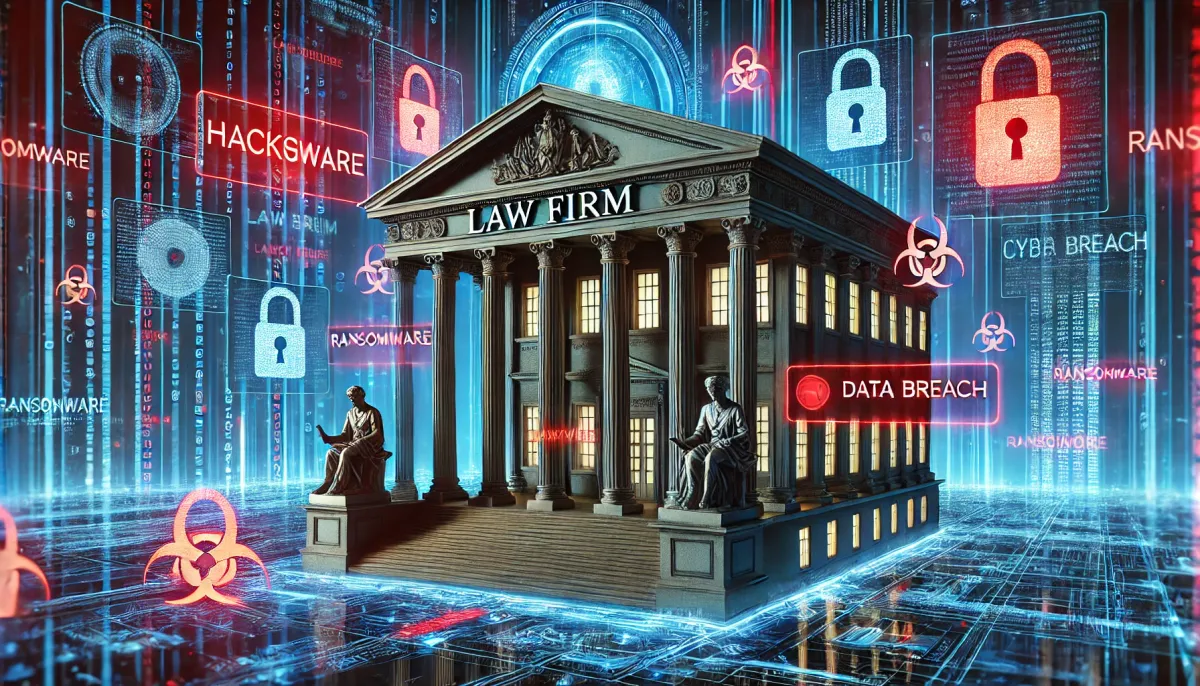Law Firms Under Siege: Understanding and Preventing Cyber Threats
Law firms are prime targets for cybercriminals, handling sensitive client data that’s ripe for exploitation. Discover why legal professionals must prioritize cybersecurity, learn about real-world breaches, and explore strategies to safeguard confidential information.

Law firms have become prime targets for cybercriminals in today's digital landscape. The nature of legal work—handling sensitive client data, valuable intellectual property, and confidential business information—makes these firms particularly attractive to hackers. Imagine the wealth of information stored in a law firm's database: personal details, financial data, and high-stakes litigation documents, all ripe for exploitation if not properly secured. Recent breaches at high-profile firms highlight just how vulnerable the legal industry is and underscore the need for robust cybersecurity measures.
So, why are law firms such a juicy target, and what can they do to protect themselves? Let's break it down.
Why Client Data Must Be Secured
Think about the type of information your law firm deals with daily—confidential client communications, legal strategies, and personal data. It's your responsibility to safeguard this data, not just because of ethical concerns but also due to legal obligations. Regulatory frameworks like the General Data Protection Regulation (GDPR) or the American Bar Association's Model Rules of Professional Conduct mandate that client data must be protected.
But securing client data isn’t just about compliance—it’s also about trust. Your clients trust you with some of their most sensitive information. A breach can shatter that trust, damage your firm’s reputation, and lead to significant financial and legal repercussions. This is why protecting client data must be a top priority.
How Cybercriminals Target Law Firms
Cybercriminals have a variety of tricks up their sleeves when it comes to infiltrating law firms. Some of the most common attack methods include:
Phishing
Phishing attacks, where fraudulent emails are sent to trick individuals into revealing sensitive information, are rampant. A seemingly innocent email from a "client" could lead to an employee unwittingly handing over login credentials or sensitive data.
Ransomware
Ransomware is a particularly nasty type of malware that locks a firm’s files until a ransom is paid. Given the time-sensitive nature of legal work, law firms are often more willing to pay to regain access to their systems, making them lucrative targets.
Data Breaches
Data breaches can expose thousands of sensitive documents at once. This kind of attack can be devastating for a firm, both financially and in terms of reputation. In some cases, hackers sell stolen information to competitors or use it to manipulate legal proceedings. For more information on types of data breaches, see our previous blog post.
How to Stay Protected
So, how can law firms protect themselves from these threats? A proactive cybersecurity strategy involves multiple layers of defense.
Encryption
Encryption is essential. It ensures that even if cybercriminals manage to steal your data, they won’t be able to read it without the proper decryption key. This is particularly important for client communications and sensitive legal documents.
Secure Document Management Systems
A secure document management system (DMS) can help keep all legal documents safe by implementing strict access controls, automated logging, and encryption. It also ensures that only authorized personnel can view or modify sensitive files.
Regular Audits
Regular cybersecurity audits are crucial for identifying and fixing vulnerabilities before hackers can exploit them. Conducting penetration tests, reviewing access controls, and checking for outdated software can help firms stay ahead of potential attacks.
Real World Scenarios
- Taft Stettinius & Hollister Ransomware Attack (2023) - In late 2023, a ransomware attack was launched against Taft Stettinius & Hollister, a major legal firm with a $598 million annual income. Hackers obtained unauthorized access to a small number of computers and workstations, revealing sensitive personal information for roughly 6,000 people. Although the firm's major systems, such as email and document management, remained unaffected, the intrusion demonstrates how even top-tier companies are vulnerable to cyber assaults. This case highlights the importance of effective incident response methods for minimizing harm and restoring customer services.
- Orrick, Herrington & Sutcliffe Breach (2023) - Another large breach occurred at Orrick, Herrington & Sutcliffe, when hackers acquired the personal information of approximately 600,000 people. The stolen data includes names, addresses, and Social Security numbers. This breach not only damaged the firm's reputation, but it also resulted in a $8 million compensation. Orrick's experience highlights the serious legal and financial ramifications that law firms face when sensitive material is compromised.
- Butler Snow (2023) - Butler Snow suffered a major breach, which impacted clients’ financial and legal data. This breach involved unauthorized access to systems containing personal and client data, including financial information. The firm immediately mitigated the issue and offered protective measures to affected clients. The breach forced the firm to offer credit monitoring to affected clients while managing potential litigation and significant trust erosion. The firm struggled to regain control of its systems, causing operational delays and financial strain.
- Burr & Foreman (2023) - Burr & Foreman’s breach compromised sensitive client records, forcing the firm to increase security investments and address severe operational disruptions. The attack significantly impacted client relationships, leading to a loss in business and the need for ongoing litigation support to mitigate long-term effects.
- Robinson & Cole (2024) - This law firm experienced a significant breach, affecting confidential client and firm data, including Social Security numbers and sensitive legal documents. The breach not only exposed personal information but also disrupted the firm's daily operations. They faced reputational damage and potential legal action from clients, further exacerbating the situation.
- 2024 A Record Year for Law Firm Data Breaches - By May 2024, 21 legal firms had already disclosed breaches, compared to 28 in all of 2023. This escalating trend underscores the growing risk that law firms face from cybercriminals, making cybersecurity a top focus for the legal profession. Smaller businesses, in particular, are frequently unprepared, lacking the resources and security procedures required to safeguard sensitive client information.
These examples illustrate the ongoing threat landscape for law firms and reinforce the importance of a proactive cybersecurity strategy, including data protection measures and incident response plans.
What to Do After a Breach
No matter how robust your cybersecurity measures are, breaches can still happen. When they do, having an incident response plan in place is key to minimizing damage.
Client Notifications
Transparency is critical. If a breach occurs, notify your clients immediately, explain the steps being taken to resolve the issue, and offer guidance on how they can protect their data. This builds trust and reassures clients that you’re handling the situation responsibly.
Breach Notifications to Authorities
Depending on the jurisdiction, there may be legal requirements to report breaches to authorities or regulatory bodies. Failure to do so can result in hefty fines or legal penalties, adding insult to injury. There are also varying timelines required for notification. For instance, Vermont requires breach notifications to be sent within 14 days of discovery, whereas Georgia requires notification “within the most expedient time possible and without unreasonable delay”.
The Importance of Employee Education
Your cybersecurity is only as strong as the people using your systems. This is why employee education is a critical part of a firm’s cybersecurity defense. All staff members—lawyers, paralegals, and administrative personnel—need to be aware of common cyber threats like phishing and understand how to spot red flags.
Regular training sessions should cover topics like secure password management, recognizing suspicious emails, and proper data handling practices. After all, even the most advanced security systems can be compromised by a single careless click. For a more in-depth conversation about how social engineering can be combated with employee education, see our previous blog.
Conclusion
In an age where cyberattacks are becoming more sophisticated and frequent, law firms cannot afford to be reactive when it comes to cybersecurity. A proactive approach, combining robust technical defenses with continuous staff education, is essential. By safeguarding sensitive data, implementing best practices, and being prepared for potential breaches, law firms can defend themselves against today’s most pressing cyber threats.
Call to action: If you're serious about protecting your firm and your clients, now is the time to invest in a cybersecurity managed service provider (MSP). With the right MSP, you’ll have the peace of mind that your firm is secure, compliant, and prepared for whatever cyber threats may come your way.
Reference
Effect, F. (2023, November 14). 7 cybersecurity threats law firms should know about. Field Effect. Retrieved October 2, 2024, from https://fieldeffect.com/blog/law-firm-cyber-security-threats/#:~:text=1.%20Credential%20theft.%202.%20Financial%20redirection.%203.%20Ransomware%20attacks.%20Why
Fajarianti, F. (2024, May 10). Why Are Law Firms Prime Targets for Hackers? armourzero. Retrieved October 2, 2024, from https://www.armourzero.com/blog/armourhacks/why-are-law-firms-prime-targets-for-hackers/
Law firms as prime targets for hackers: 7 steps to reducing cyber risks | Insights & Events | Charles River Associates. (n.d.). https://www.crai.com/insights-events/publications/law-firms-as-prime-targets-for-hackers-7-steps-to-reducing-cyber-risks/#:~:text=Aniket%20Bhardwaj%20reviews%20why%20law%20firms%20are%20attractive%20cyber%20targets
Mounir Maurice Stratemedia. (2023, August 31). Cyber Security for Law Firms: Essential Tips and Practices - AKAVEIL. AKAVEIL. https://akaveil.com/blog/cyber-security-for-law-firms-essential-tips-and-practices/
Wiederhoeft, H. (2024, May 24). Protecting Against Cyber Threats in Law Firms. Alert Logic. https://www.alertlogic.com/blog/legal-sector-cybersecurity/#:~:text=Law%20firms,%20entrusted%20with%20sensitive%20client%20data%20and%20privileged%20information,





